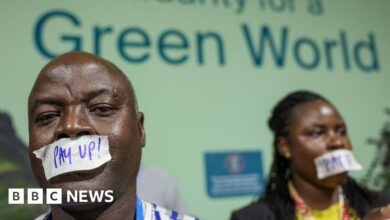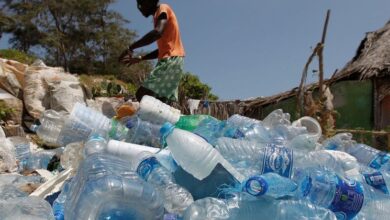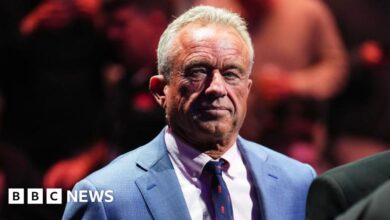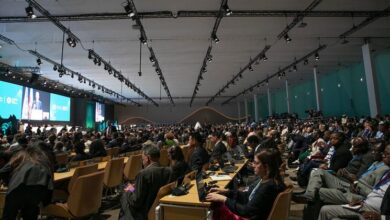Guterres highlights Timor-Leste’s ‘growing international influence’
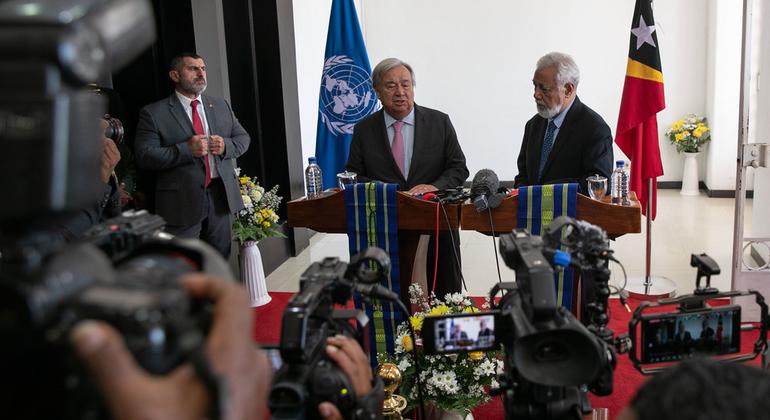
António Guterres was there to attend a ceremony marking the 25th anniversary of the country’s vote for independence, organised by the then-United Nations mission in East Timor.
The country gained independence in 2002 after months of violence and sabotage, ending years of rule by Portugal and then Indonesia, which annexed the country in 1975.
Remembering Timorese leader
On the second day of his official visit to Timor-Leste, the UN Secretary-General met with Prime Minister Xanana Gusmão, expressing his “deep gratitude” to the former resistance leader for “the sacrifices he made to gain independence for his country and his people”.
Mr Gusmão – the first president of the newly independent nation – was detained for six years in Indonesia and was only released when the occupation ended in 1999.
Voice for the future
Speaking to journalists at the Government Palace in Dili, the UN chief highlighted Timor-Leste’s record in strengthening democracy and human rights, as well as its “growing international influence”.
Guterres recalled that the Asian nation is a founding member of the G7+, a group of countries that have emerged from conflict and will soon join the ASEAN regional bloc. The secretary-general said he is counting on Timor-Leste to play a leading role in supporting a future peace process in Myanmar, which has been in turmoil since a 2021 military coup overthrew a democratically elected government.
He told Timor’s veteran leader that he was counting on the country’s voice at Summit of the Future in September, to build “a world where the United Nations Charter is respected.”

A billboard welcoming UN Secretary-General António Guterres to Timor-Leste.
Top Portugal
The Secretary-General also visited the Timorese Resistance Museum and Archives in the capital Dili, where he was able to view the permanent exhibition “Resistance is Victory”.
As former Prime Minister of Portugal from 1995 until Timor-Leste’s independence, Mr Guterres has found himself featured in some of the archives on display.
He was able to confirm the historical accuracy of a piece of evidence stating that Portugal had threatened to withdraw its troops from Bosnia and Kosovo – and leave the North Atlantic Treaty Organization, NATO.
The call comes at a time when some leaders are calling for immediate intervention by peacekeepers to protect the people of Timor-Leste from the violence that has erupted following the referendum.
The UN Secretary-General also visited a model hideout of Timorese resistance fighters.
Meet the women of resistance
Mr. Guterres then visited the “Women of Timor-Leste” exhibition organized by the gender equality agency. United Nations Womenportrays the life stories of resistance veterans and human rights defenders.
He was welcomed and accompanied by Hilda da Conceição, who during the years of the resistance had the code name Lalo Imin, a combination of her grandmother’s name and an acronym meaning “independence or death, never integration”.
Another veteran represented in the exhibition is Maria Domingas “Mikato,” who organized the first Timor-Leste Women’s Congress, held before the 1999 referendum. She is credited with being a driving force behind the decision in that vote to allocate about 30 percent of political representation to women.
According to UN Women, Timor-Leste’s electoral law requires that 33 percent of political party lists must be women. Currently, 38 percent of seats in parliament are held by women – the highest proportion in the Asia-Pacific region.
Reflections on Gaza and Ukraine
The UN Secretary-General ended his day firmly in the present, with an appearance on “The President Horta Show”, broadcast on national television. The taping was also attended by Prime Minister Gusmão.
Mr. Guterres emphasized his role in leading Portugal to support independence in East Timor.
According to him, the factors that made the referendum and the peaceful transition to independence possible were “the common affirmation of the people with total determination, which could not but be won”, along with the fact that there was no fundamental geopolitical division between the power blocs at that time, as there is today.
Furthermore, the UN leader expressed his continued concern about Russia’s ongoing full-scale invasion of Ukraine, which violates United Nations Charter and international law of a permanent member of the Security Council.
The Secretary-General also mentioned the war in Gaza as an example of the Security Council’s limitations amid internal divisions.
To applause from the audience, the UN chief said that like Timor-Leste, the Palestinian people also have the right to self-determination and their own secure state, in accordance with the principles backed by the UN. two-state solution.
The Power of Reconciliation
The prime minister stressed that during his detention in Indonesia, he witnessed the suffering firsthand and came to the conclusion that the problem was not with the Indonesian people but with the political regime in power.
President José Ramos Horta – winner of the 1996 Nobel Peace Prize – highlighted how he used lessons learned from Timor-Leste’s reconciliation process to provide perspective on other post-conflict situations, such as Colombia’s ongoing peace and reconciliation process.
He recalled that during the many years of armed struggle in Timor-Leste, there had never been a kidnapping or attack on Indonesian civilians.
Prime Minister Gusmão claimed that during the conflict, the guerrillas he commanded regularly provided medical care to wounded Indonesian soldiers, something he himself claimed to have done twice.

